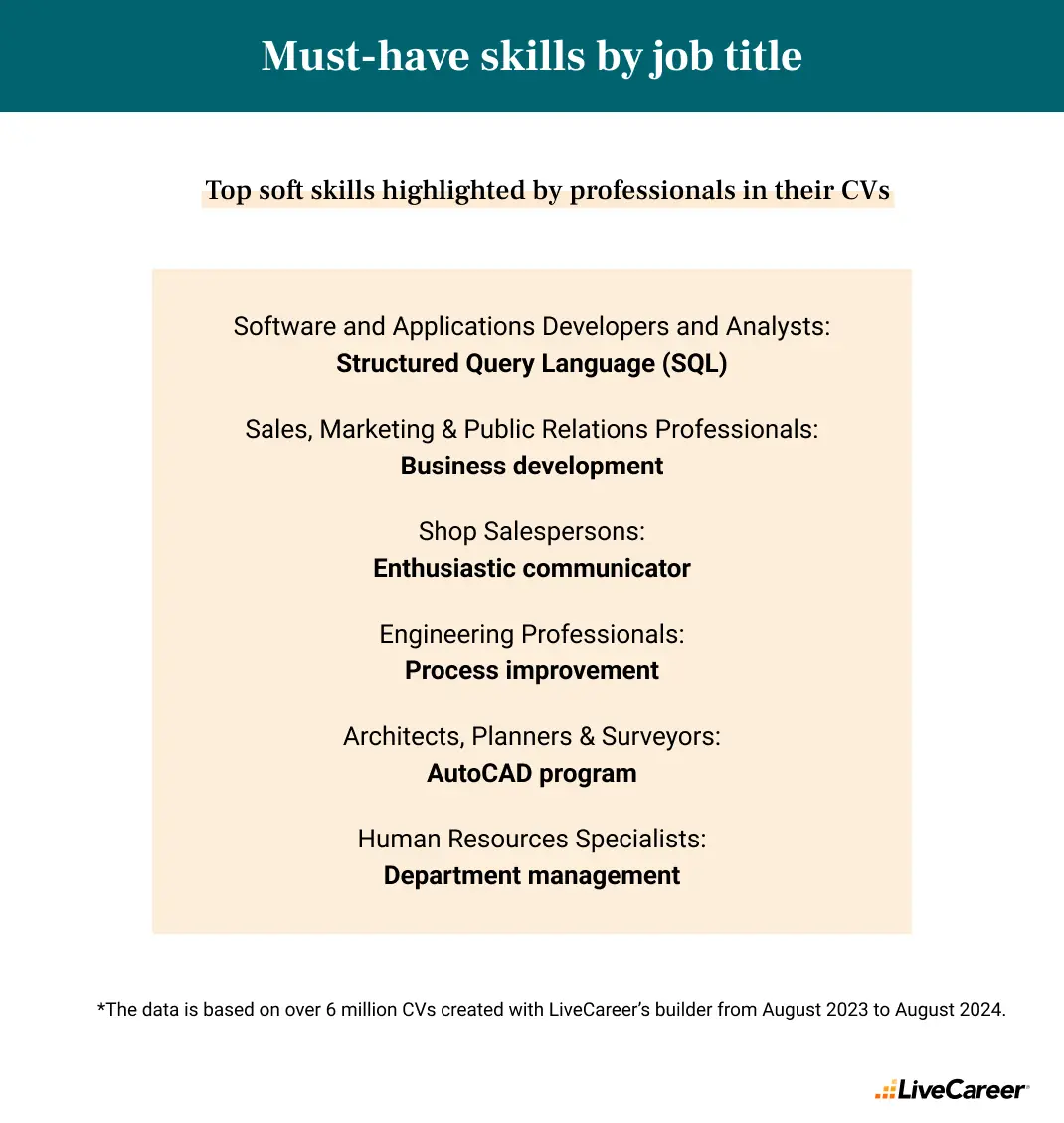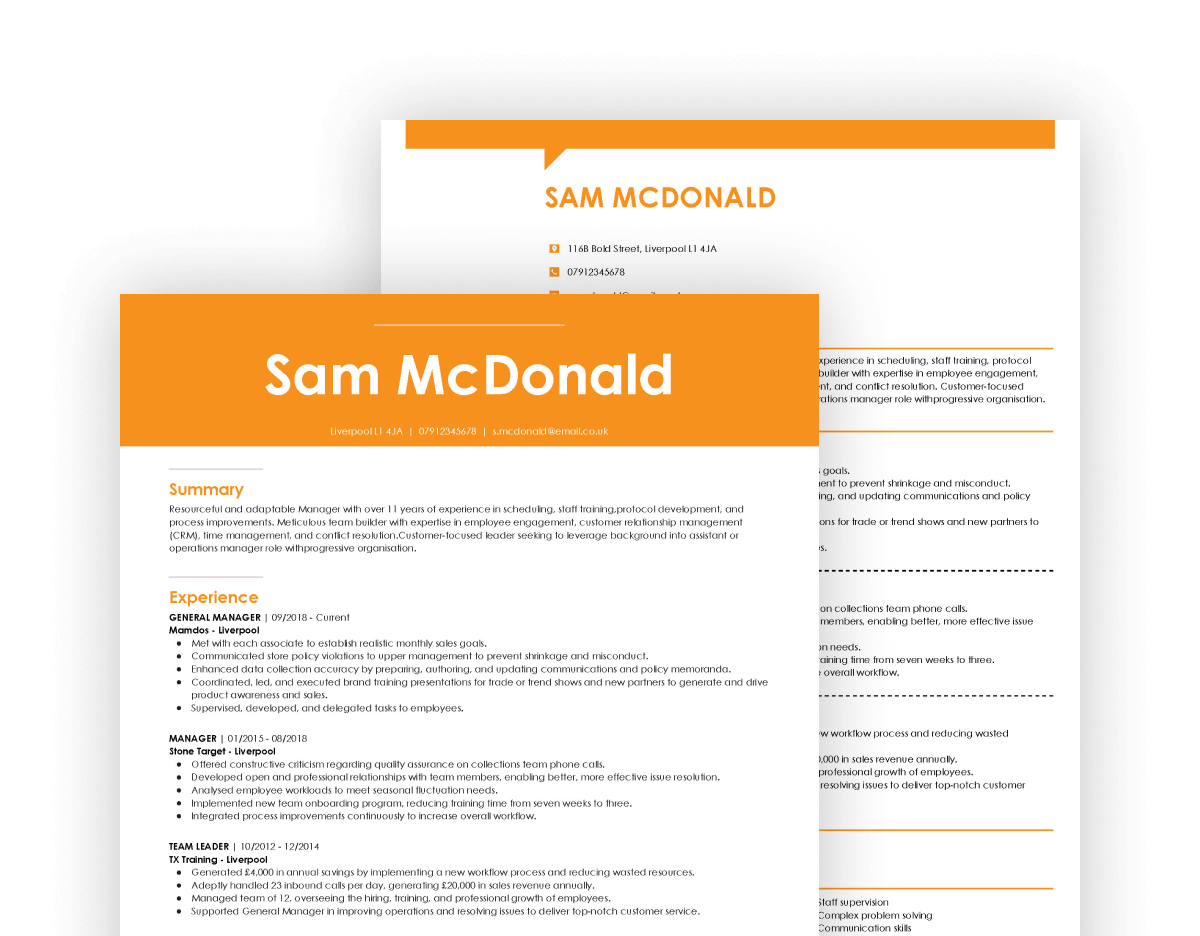
100+ Best Skills for a CV (Examples & How to Include)
Show that you've got what it takes with our list of 100+ key skills for a CV. See 100+ CV skills examples and how to include good hard and soft CV skills.
Our customers were hired by:
Having the right skills on your CV can make all the difference. But how do you know which skills truly stand out for your profession?
I’ve analysed over 6 million CVs created with the LiveCareer CV builder over the past 12 months, identifying the top skills professionals featured in their applications. Whether you're in tech, marketing, healthcare, or other field, this article will help you tailor your CV to showcase the most significant skills.
Ever struggled to choose the right skills for your CV? Or wondered which ones could boost your chances of landing the job? Here’s a breakdown of the top skills highlighted by professionals in the most common roles across industries between August 2023 and August 2024, giving insight into what jobseekers prioritised in their applications.

Tech roles in the UK continue to be highly competitive, and professionals are expected to master both technical and soft skills. Skills most frequently mentioned by this job group include:
The prominence of SQL, JavaScript, and Python highlights the demand for strong coding skills. Upwork's 2024 report shows that skills like full-stack, front-end, back-end, and mobile app development are all in high demand across various industries. In turn, project management and team player skills indicate the need for developers and analysts to work as a team and coordinate complex projects.
The most commonly highlighted skills across ICT & operations specialists are:
IT support technicians need a combination of technical expertise and customer-facing skills. Troubleshooting proficiency and application support are at the core of their responsibilities, but customer service expertise and desktop support demonstrate a bigger emphasis on user experience. With the popularity of remote work, skills like active directory and computer backup management are key for smooth operations between dispersed workplaces.
The healthcare industry remains one of the most skill-specific fields, with roles like medical doctors and nurses focusing primarily on patient care and clinical expertise. The most frequently referenced abilities within this job group include:
For doctors, the emphasis on patient education and mental health assessments highlights the significance of holistic care and preventive medicine. Research shows that patient-centered care, including effective communication, improves patient outcomes and satisfaction.
The top skills most frequently noted by this profession include:
Nursing professionals focus on compassionate care and medication administration skills that demonstrate the balance between technical proficiency and interpersonal empathy. At the same time, the addition of risk management and accurate record-keeping highlights the increasing regulatory demands and the importance of careful documentation in healthcare environments.
Since the marketing field has become more data-driven in recent years, professionals working in this sector need to juggle creativity and analytics. The most commonly listed skills by marketing & communications specialists are:
Marketing professionals see a blend of traditional skills like Sales and market development with more strategic skills like market and competitive analysis and business planning. A recent report shows that 72% of marketing leaders are investing in data analytics and competitive analysis to sharpen their strategies. Relationship management and project management reflect the collaborative nature of marketing projects, where both cross-team coordination and long-term strategy can lead to success.
Key skills often cited by finance professionals include:
For finance professionals, technical expertise like bank reconciliations and full-cycle accounting remain at the core, but there’s also a growing need for forward-looking skills such as budget forecasting expertise and financial planning. As the finance industry becomes more data-centric, general ledger accounting and financial reporting skills show the critical role of accuracy and transparency in financial operations. The rise of fintech and automation tools also means that manual tasks like data entry are more streamlined but still vital to maintain accuracy.
General office clerks focus on core administrative tasks that keep the office running smoothly. They tend to list these top skills in their CVs most frequently:
In their CVs, general office clerks emphasise proficiency in Microsoft Office, given its role in daily tasks like word processing, spreadsheets, and email management. Multitasking and prioritisation are essential, too, as clerks often manage multiple responsibilities at the same time. Strong interpersonal skills and customer service are also important since clerks are frequently the first point of contact within an organisation.
Administration professionals typically operate at a more strategic level than office clerks, requiring skills that reflect managerial and operational oversight. These are the top skills mentioned by administration professionals:
Requirements gathering and process improvement indicate their involvement in streamlining workflows and ensuring that business processes are effective. In turn, project management and strong leadership skills highlight their responsibility for guiding teams and projects to success. Interestingly, administration professionals also frequently indicate business development skills in their applications, highlighting the expanding role of administration in contributing to an organisation’s prosperity.
Skills commonly highlighted by this profession are:
For legal professionals, the foundational skills are Case interpretation and Legal research. However, including dispute resolution and team collaboration shows a growing emphasis on resolving conflicts outside the courtroom and working within multidisciplinary teams. The ability to interpret complex documents, such as contracts, and manage litigation are crucial, but there’s clearly a trend toward more collaborative and holistic legal work.
Skills most frequently listed by this group include:
In education, primary and early childhood teachers need to balance behaviour management with creative lesson planningto maintain control in the classroom while fostering a creative learning environment. The emphasis on inclusive learning techniques reflects the growing importance of diversity and accessibility in education, ensuring every student’s needs are addressed regardless of learning style or ability.
University and higher education teachers include these skills most frequently:
University educators, on the other hand, focus more on curriculum development and research presentations. These skills highlight the multi-faceted responsibility of higher education teachers: developing robust academic programs while contributing to their fields through research. The increasing use of digital tools is seen in online lesson delivery and interactive teaching, which are critical for engaging students both virtually and in person.
These are the most frequently mentioned skills by this job group:
For shop salespersons, customer-facing skills like enthusiastic communicator and POS systems proficiency are critical to boosting sales. However, business development and brand awareness show a broader strategic focus in retail, where salespeople are also responsible for promoting brand loyalty and adding value to customer experience. In a digitalised world, even entry-level retail positions require a mix of technology and interpersonal skills.
The most commonly mentioned skills include:
Client information workers, including customer service representatives, account managers, and consultants, focus on live chat support and remote teamwork, proving how customer service has shifted online. The significance of Salesforce and customer data management highlights the essential need for effective customer relationship management (CRM) and proficient navigation of CRM systems to build strong client connections and drive business growth.
These professionals highlight specifically the below skills:
For engineers, process improvement and root cause analysis are critical to maintaining efficiency and solving problems. As industries focus more on sustainability and cost efficiency, skills like cost management and risk assessment are gaining importance. Team leadership and communication skills remain important soft skills for engineers, especially since they work in cross-functional teams more often.
Architects and designers need a mix of creative and technical skills. This job group focuses particularly on these skills in their applications:
Here, AutoCAD and Adobe Creative Suite dominate the technical side, while graphic and media design and creativity underscore the importance of visual and aesthetic design. The ability to manage projects from conception to completion is crucial in architecture and design roles.
Creative and performing artists tend to include these skills in their CVs:
In the creative sector, Live performance and Creativity are still central, but there’s also an increasing need for practical skills like project management and problem-solving. As creative professionals take on more freelance and self-directed work, the ability to manage both the creative and business sides of their projects is crucial. Adaptability is also key, as the creative industries often require professionals to shift gears quickly and respond to new challenges.
Hospitality managers require a balance of customer service and operational skills. These are the most commonly listed skills among this job group:
Hotel and restaurant managers often highlight customer service and sales skills, but the emphasis on labour cost control and forecasting and planning shows a need for strong financial and logistical management in this fast-paced industry. As hospitality continues to recover after the pandemic, operational efficiency and adaptability are more critical than ever.
The most frequently listed skills by this job group include:
For cleaners and helpers, practical skills like stain removal and kitchen sanitising are vital. Exceptional communication skills are also listed among the top skills for these roles. This shows how much these positions require direct interaction with clients and the need to maintain high service standards, particularly in luxury and high-end environments.
HR specialists tend to focus specifically on these abilities:
HR professionals highlight employee relations and retention strategies, reflecting the growing importance of maintaining a healthy workplace culture and keeping top talent in-house. HR and recruitment skills remain critical, but the need for logistics management and stock management shows how HR is expanding beyond traditional hiring roles to assume more operational oversight.
On average, software developers and ICT technicians list around 6 to 6.5 skills, reflecting the technical nature of their roles. Similarly, medical doctors and registered nurse specialists tend to include 6.5 and 7.5 skills, emphasising both clinical and interpersonal competencies.
In marketing and sales,professionals feature around 7 skills, while finance specialists list 5, and accounting professionals list 7. General office clerks, administration professionals, and legal professionals consistently include about 7 skills, balancing administrative and organisational abilities. Primary school teachers and freelance architects highlight the most, with 8 skills on average, underlining their versatility.
In customer-facing roles, shop salespersons, customer service workers, and hotel room attendants generally list 5 to 7 skills, while hotel managers and HR specialists list 7 to 8, focusing on operational and people management skills. Higher education lecturers include fewer skills, averaging 5, likely reflecting their specialised academic focus. Creative and performing artists and architectural engineers tend to include about 6.5 to 7 skills, combining technical expertise and creative problem-solving.
As work environments change and evolve, so do the skills employers seek in candidates. Our analysis shows several important trends:
As technology continues to shake up many industries, professionals must focus on developing skills that will be in demand in the coming years. Our data indicates that tech proficiency, remote collaboration tools, and data-driven decision-making will be increasingly valuable across industries.
Roles in HR, marketing, and administration will likely see an even greater need for automation and data management, while technical professionals should remain proactive in adopting new solutions and technologies. By following these trends, as a candidate, you have greater chances to remain relevant and competitive when searching for a job.
The findings of this study are derived from an analysis of authentic professional CVs crafted by users of the LiveCareer CV builder—individuals of varying ages from diverse locations, industries, and career stages. These CVs were generated by professionals holding over 2,200 unique job titles. The documents analysed were created between August 2023 and August 2024.
Our editorial team has reviewed this article for compliance with Livecareer’s editorial guidelines. It’s to ensure that our expert advice and recommendations are consistent across all our career guides and align with current CV and cover letter writing standards and trends. We’re trusted by over 10 million job seekers, supporting them on their way to finding their dream job. Each article is preceded by research and scrutiny to ensure our content responds to current market trends and demand.
About the author
Patrycja is a career expert who specialises in helping you create compelling CVs and cover letters. With over 10 years of experience in content creation processes, she brings her expertise to the forefront of the industry.
Rate this article:
Top skills per job title
Average:


Show that you've got what it takes with our list of 100+ key skills for a CV. See 100+ CV skills examples and how to include good hard and soft CV skills.

Unlock the power of your CV with our curated technical skills examples accompanied by expert advice. Elevate your CV and show your technical prowess.

Everyone is employable, but some more than others, and it’s usually down to how you present your skills. So get the edge, and see the top employability skills examples in our guide.
Our customers were hired by: